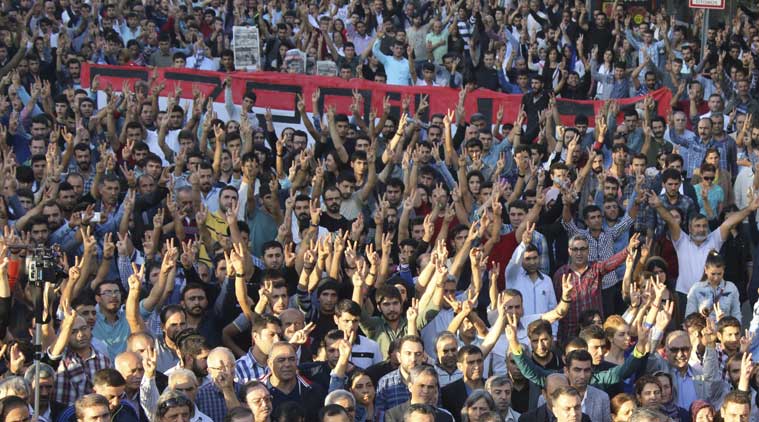Saturday’s terrorist attack in Ankara: Is Turkey headed for collapse?
The roots of the crisis lie in 2009, when the Islamist regime of President Recep Tayyip Erdogan saw in the Arab Spring an opportunity to place Turkey at the centre of a new West Asian order.
 Protesters flash the V-sign during a rally to protest Saturday’s explosions in Diyarbakir, Turkey, Sunday, Oct. 11, 2015. (Source: AP)
Protesters flash the V-sign during a rally to protest Saturday’s explosions in Diyarbakir, Turkey, Sunday, Oct. 11, 2015. (Source: AP)
“We are in the Middle East”, the prominent Turkish journalist Mehmet Barlas wrote after suspected Islamic State suicide-bombers targeted a rally in Ankara on Saturday, killing at least 97—the worst terrorist attack in the county’s history. “A bomb goes off, people die. We, too, are a Middle Eastern country”.
Except, Turkey isn’t: Mehmet Barlas himself is known to enjoy a drink now and again; he is married to the highly-westernised Canan Barlas; lives in a villa which, like others in Istanbul, draws on lifestyle ideals shaped in Europe; he has a sense of humour the religious police in Riyadh would not approve of.
Geography, though, can be destiny—and the bombing has led many to ask if Turkey can escape its neighbourhood’s fate.
[related-post]
The roots of the crisis lie in 2009, when the Islamist regime of President Recep Tayyip Erdogan saw in the Arab Spring an opportunity to place Turkey at the centre of a new West Asian order. The idea, Foreign Minister Ahmet Davatoglu said, was to build a kind of born-again Ottoman Empire, in which Istanbul would “reintegrate the Balkan region, Middle East and Caucasus.”
Like most grand geopolitical plots, this one soon veered off-script. The Arab Spring collapsed into the Arab Summer—a searing cauldron of jihadist violence. Erdogan’s backing to so-called moderate rebels in Syria—in fact, mainly Islamists linked to the Muslim Brotherhood—handed victory over to al-Qaeda and the Islamic State.
In turn, the jihadist onslaught led western governments to arm the Kurds—the ethnic group at the centre of Turkey’s long-running ethnic-religious secessionist insurgency.
Fearful of growing Kurdish power, Erdogan’s government ordered strikes against the insurgent Partiya Karkerên Kurdistan or PKK—which retaliated by killing well over 100 Turkish police and military officers.
Islamic State jihadists, meanwhile, carried their anti-Kurdish campaign in Syria and Iraq into Turkey—notably staging a suicide bomb strike that claimed 33 lilves this summer.
There are, as things stand, three reasons to believe the violence in Turkey will escalate. First, over 1,400 Turkish citizens are now serving with the Islamic State and other jihadist groups—a core that could bring the war home.
In addition, there’s growing Turkish nationalist aggression against the Kurds—something which could legitimise, or fuel, Islamist violence.
Finally, there’s the Kurdish problem. Though Kurdish groups had announced they would re-initiate a ceasefire, continued terrorist attacks and right-wing mobilisation make any future peace deal that much harder.
Having said that, Turkey isn’t Iraq or Egypt: in spite of Erdogan’s growing authoritarianism, there is a robust democratic tradition; civil society is vibrant; women’s freedoms are strong; and the economy, though slowing, isn’t about to collapse. The Turkish state, moreover, has thus far demonstrated that its roots are too deep to be swept aside by insurgencies or terrorism.
- 01
- 02
- 03
- 04
- 05





































